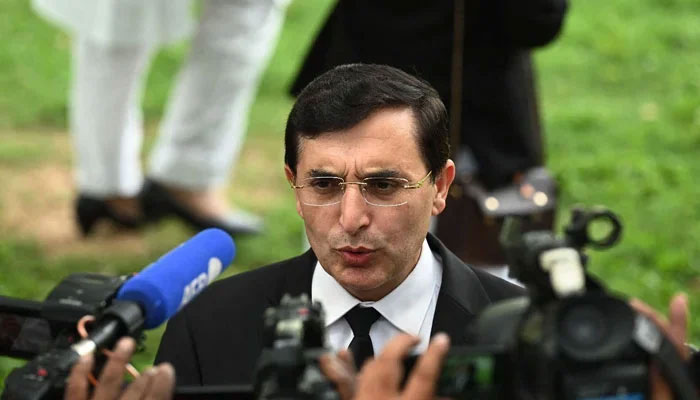A charter for the future
Gohar clarified, however, that Imran Khan has not pressured anyone to negotiate any deals
PTI Chairman Barrister Gohar Ali Khan stated on Tuesday that incarcerated party founder Imran Khan has not authorised any party leader to engage in talks with the establishment. His comments came in the wake of PTI leader Azam Swati’s claim that he had been given the green light by Imran to reach out to the establishment for resolving ongoing issues. Gohar clarified, however, that Imran Khan has not pressured anyone to negotiate any deals. Meanwhile, senior PML-N leader and Adviser to the Prime Minister on Political and Public Affairs Rana Sanaullah has criticised the PTI for what he has described as confused and inconsistent political messaging. The critique is that if the PTI believes its problems can be resolved through backchannel talks with the establishment, it is gravely mistaken. So, Rana has urged the party to instead engage directly with political stakeholders and not rely on the establishment for solutions. He has also emphasised that a new Charter of Democracy is crucial if Pakistan hopes to address its deepening political and economic crises.
Calls for such a charter are not new. During Imran Khan’s tenure as prime minister, then opposition leader Shehbaz Sharif proposed a Charter of Economy to bring political consensus on critical economic matters. That proposal was dismissed by Imran. Later, when the PDM alliance assumed power through a no-confidence motion, it again encouraged the PTI to engage in political dialogue, but the response was the same: refusal. In December of last year, when the current PDM-led government took office, talks were initiated between the two sides. However, the effort collapsed when the PTI walked away from the dialogue just a month later. Political commentators, who had initially praised the PTI for showing willingness to engage, later criticised the party for its lack of consistency and political maturity. It is now abundantly clear that Pakistan’s political crisis has reached an unsustainable level, and only a collective and inclusive approach can yield a lasting solution. When political parties turn to unelected institutions for ‘deals’ or solutions, democratic norms are inevitably undermined. If political leaders fail to come together, define mutual boundaries and determine a shared path forward, they leave the field open for non-political forces to shape the future – something that only ends up weakening democratic institutions further.
While a trust deficit exists between the PTI and other parties — an outcome of years of mutual hostility and political brinkmanship — all sides must realise that if the current system persists in its dysfunctional state, the hybrid political model will only deepen. The PTI, in particular, needs to reassess its strategy. If it continues to bypass its political counterparts in favour of the establishment, it not only isolates itself but also endangers the entire democratic framework. Other parties, despite having engaged with the establishment at times, now seem more cognisant of the risks such dependency poses. The PTI must shed its contradictory political posture and rejoin the democratic process by engaging with the government and encouraging broader opposition participation. Critical matters such as ensuring the next elections are free, fair and transparent, and maintaining economic stability through consensus-driven policy decisions, demand cross-party cooperation. Dialogue among political parties remains the only viable path forward. Call it a Charter of Democracy 2.0 or anything else — the name is immaterial. What matters is preserving and strengthening Pakistan’s democratic system.
-
 Why Prince William Releases Statement On Epstein Scandal Amid Most 'challenging' Diplomatic Trip?
Why Prince William Releases Statement On Epstein Scandal Amid Most 'challenging' Diplomatic Trip? -
 Historic Mental Health Facility Closes Its Doors
Historic Mental Health Facility Closes Its Doors -
 Top 5 Easy Hair Fall Remedies For The Winter
Top 5 Easy Hair Fall Remedies For The Winter -
 Japan Elections: Stock Surges Record High As PM Sanae Takaichi Secures Historic Victory
Japan Elections: Stock Surges Record High As PM Sanae Takaichi Secures Historic Victory -
 Prince William, Kate Middleton Finally Address Epstein Scandal For First Time: 'Deeply Concerned'
Prince William, Kate Middleton Finally Address Epstein Scandal For First Time: 'Deeply Concerned' -
 Kim Kardashian Promised THIS To Lewis Hamilton At The 2026 Super Bowl?
Kim Kardashian Promised THIS To Lewis Hamilton At The 2026 Super Bowl? -
 Andrew Mountbatten-Windsor Throws King Charles A Diplomatic Crisis
Andrew Mountbatten-Windsor Throws King Charles A Diplomatic Crisis -
 Barack Obama Hails Seahawks Super Bowl Win, Calls Defense ‘special’
Barack Obama Hails Seahawks Super Bowl Win, Calls Defense ‘special’ -
 Pregnant Women With Depression Likely To Have Kids With Autism
Pregnant Women With Depression Likely To Have Kids With Autism -
 $44B Sent By Mistake: South Korea Demands Tougher Crypto Regulations
$44B Sent By Mistake: South Korea Demands Tougher Crypto Regulations -
 Lady Gaga Makes Surprising Cameo During Bad Bunny's Super Bowl Performance
Lady Gaga Makes Surprising Cameo During Bad Bunny's Super Bowl Performance -
 Paul Brothers Clash Over Bad Bunny's Super Bowl Performance
Paul Brothers Clash Over Bad Bunny's Super Bowl Performance -
 South Korea: Two Killed As Military Helicopter Crashes During Training
South Korea: Two Killed As Military Helicopter Crashes During Training -
 Elon Musk Unveils SpaceX’s Moon-first Strategy With ‘self Growing Lunar City’
Elon Musk Unveils SpaceX’s Moon-first Strategy With ‘self Growing Lunar City’ -
 Donald Trump Slams Bad Bunny's Super Bowl Performance: 'Absolutely Terrible'
Donald Trump Slams Bad Bunny's Super Bowl Performance: 'Absolutely Terrible' -
 Jake Paul Criticizes Bad Bunny's Super Bowl LX Halftime Show: 'Fake American'
Jake Paul Criticizes Bad Bunny's Super Bowl LX Halftime Show: 'Fake American'




